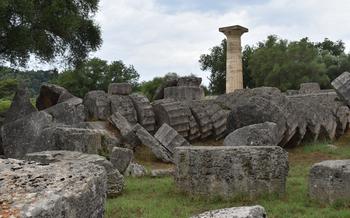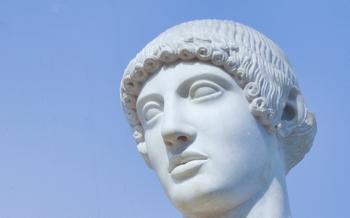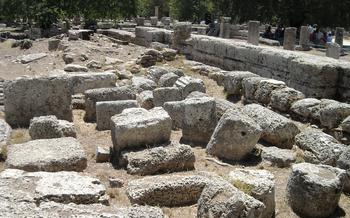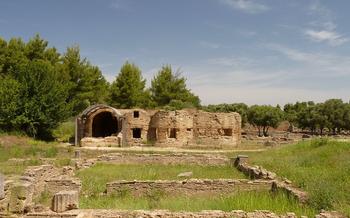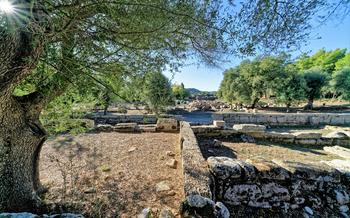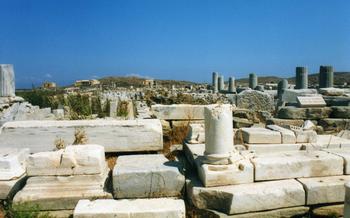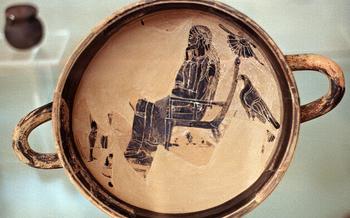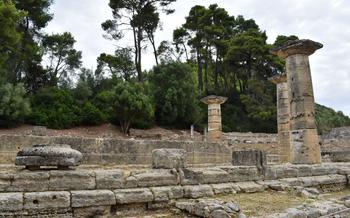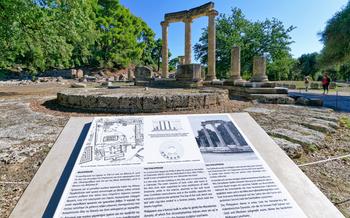
Dodoni Ancient Theatre and Oracle
- The Dodoni Ancient Theatre
- The Archaeological Museum of Dodona
- The Natural Beauty of Dodona
- Exploring the Region
- Local Cuisine and Hospitality
- The Role of Dodona in Greek Mythology
- The Archaeological Significance of Dodona
- The Legacy of Dodona
- Dodona in Literature and Art
- The Spiritual Significance of Dodona
- Insider Tip: Embark on a Mystical Journey Under the Full Moon
The Dodoni Ancient Theatre
The ancient theater of Dodona is a remarkable and well-preserved structure that played a significant role in the cultural and religious life of ancient Greece. Built in the 3rd century BC, it is one of the oldest theaters in Greece and offers a glimpse into the architectural achievements and artistic traditions of the ancient world.
The theater is situated on a hillside, commanding a breathtaking view of the surrounding landscape. Its construction showcases the ingenuity and skill of ancient Greek architects. The seating area, divided into 18 tiers, could accommodate up to 18,000 spectators, making it one of the largest theaters in ancient Greece.
The theater's acoustics are exceptional, allowing the voices of actors and performers to carry clearly throughout the auditorium. This remarkable feature contributed to the immersive experience of attending a performance in the ancient theater.
The Dodoni theater hosted a variety of events, including plays, festivals, and religious ceremonies. It served as a venue for dramatic performances, musical concerts, and theatrical competitions. The theater's stage provided a platform for actors to showcase their talents and captivate audiences with their storytelling and artistry.
In addition to its cultural significance, the theater also played a role in religious rituals and ceremonies. It was a sacred space where the community gathered to honor the gods and celebrate religious festivals. The theater's proximity to the Dodoni Oracle added to its spiritual significance, making it a place where the divine and the human realms intersected.
The Archaeological Museum of Dodona
The Archaeological Museum of Dodona is a treasure trove of artifacts and exhibits that provide a glimpse into the rich history and cultural heritage of the ancient Dodoni Sanctuary. Established in 1938, the museum houses a comprehensive collection of artifacts unearthed during excavations at the site, offering visitors an immersive journey into the past.
Among the highlights of the museum's collection are exquisite sculptures, including marble statues of Zeus and Dione, the divine couple associated with Dodona. These statues showcase the remarkable skill and artistry of ancient Greek sculptors, capturing the essence and majesty of the deities they represent.
The museum also boasts an impressive collection of inscriptions, offering valuable insights into the religious practices and daily life of the ancient Dodonian community. These inscriptions include dedications to the gods, decrees, and financial records, shedding light on the economic and administrative aspects of the sanctuary.
Furthermore, the museum displays a diverse array of pottery, ranging from utilitarian vessels to elaborately decorated vases. These artifacts provide glimpses into the domestic life and artistic traditions of the ancient Greeks, showcasing their creativity and craftsmanship.
The Archaeological Museum of Dodona is not just a repository of ancient artifacts; it is a place where the past comes alive, allowing visitors to connect with the history and culture of this sacred site. The museum's exhibits, presented with meticulous care and attention to detail, create a vivid tapestry of the ancient world, inviting visitors to explore the wonders of Dodona and its enduring legacy.
The Natural Beauty of Dodona
The Dodoni Sanctuary is not just a place of historical and religious significance; it is also a place of breathtaking natural beauty. The sanctuary is nestled amidst lush greenery, forests, and mountain views, creating a serene and tranquil atmosphere. The integration of natural elements into the ancient sanctuary enhances its spiritual significance, as the ancient Greeks believed that nature was sacred and closely connected to the divine.
Visitors to Dodona can immerse themselves in the natural beauty of the site. They can stroll through the lush forests, admire the mountain views, and feel the tranquility of the surroundings. The natural elements at Dodona contribute to the unique and immersive experience of visiting this ancient sanctuary, making it a place of both historical and natural wonder.
Exploring the Region
The region of Epirus, where Dodona is located, offers a wealth of additional attractions and points of interest for visitors. History buffs can explore other ancient sites, such as the Necromanteion of Acheron, a sacred oracle dedicated to the underworld, or the Oracle of Zeus at Ammon, another important religious center in ancient Greece. Nature enthusiasts will be captivated by the stunning landscapes of the region, including the Vikos Gorge, one of the deepest canyons in the world, the Voidomatis River, known for its crystal-clear waters and trout fishing, and Mount Olympus, the highest mountain in Greece. For those seeking adventure, there are ample opportunities for hiking, rafting, and other outdoor activities amidst the region's breathtaking scenery.
Local Cuisine and Hospitality
The Epirus region is renowned for its culinary traditions and warm hospitality. Traditional dishes are prepared with fresh, local ingredients, showcasing the region's rich flavors. Sample the delectable cheese pie, known as "pita me tyri", or savor the hearty "hondros", a type of thick pasta with tomato sauce and cheese. Indulge in "kreatopita", a meat pie made with lamb or beef, or try the "tsipoura", a grilled sea bass.
Local tavernas offer a welcoming atmosphere, where you can feast on these traditional delicacies while enjoying the company of friendly locals. Experience the "filotimo", the Greek concept of hospitality, as you are treated to warm smiles and attentive service.
Don't miss the opportunity to visit a local market to witness the vibrant colors and aromas of fresh produce, spices, and herbs. Engage with the friendly vendors, who will gladly share their knowledge about the local cuisine and recommend the best ingredients for your culinary adventures.
The Role of Dodona in Greek Mythology
Dodona's prominence in Greek mythology is a testament to its profound religious and cultural significance. The oracle was closely associated with major deities, including Zeus, the king of the gods, and Dione, his consort. According to myths, Zeus and Dione were the divine couple who presided over the oracle and were responsible for its prophetic powers.
The oracle played a pivotal role in various mythological events and stories. In the myth of the Golden Fleece, the Argonauts sought guidance from the oracle before embarking on their epic quest to retrieve the fabled treasure. The oracle also featured prominently in the Trojan War, as both the Greeks and Trojans consulted the oracle to gain favor and divine guidance in their conflict.
The influence of Dodona extended beyond its immediate surroundings, shaping the development of Greek mythology as a whole. The oracle's prophecies and divine interventions became integral to many mythological narratives, adding an element of the sacred and the supernatural to the tales. Dodona's legacy in Greek mythology is a testament to its enduring importance in the religious and cultural fabric of ancient Greece.
The Archaeological Significance of Dodona
The archaeological discoveries at Dodona have played a crucial role in shedding light on the site's rich history and religious significance. Excavations conducted over the years have unearthed a wealth of artifacts, including bronze statuettes, pottery fragments, inscriptions, and architectural remains. These findings have provided valuable insights into the daily life, religious practices, and cultural traditions of the ancient Greeks who inhabited Dodona.
The artifacts discovered at Dodona have helped archaeologists reconstruct the layout of the sanctuary and gain a better understanding of its various structures. The remains of temples, altars, and other religious buildings have been identified, providing clues about the rituals and ceremonies that took place at the site. Inscriptions found at Dodona have also been instrumental in deciphering the ancient Greek language and understanding the oracle's practices.
The archaeological significance of Dodona extends beyond the physical remains found at the site. The discovery of votive offerings, such as small statues and jewelry, suggests that Dodona was a popular destination for pilgrims who sought guidance and protection from the oracle. These offerings provide valuable insights into the beliefs and religious practices of the ancient Greeks.
Ongoing excavations at Dodona continue to yield new discoveries, enriching our understanding of this important ancient site. Archaeological research at Dodona has contributed significantly to our knowledge of ancient Greek religion, history, and culture, making it a site of immense archaeological significance.
The Legacy of Dodona
The impact of the Dodoni oracle extended far beyond its time and influenced both Greek and Roman civilization. Its reputation as a renowned oracle attracted people from all over the ancient world, seeking guidance and prophecies on various matters. The oracle's influence on religious beliefs and practices was significant, as it played a crucial role in shaping the religious landscape of ancient Greece.
Dodona's legacy is still felt today, as it remains a site of historical and cultural significance. The archaeological excavations and discoveries at Dodona have shed light on its ancient practices and beliefs, providing valuable insights into the religious and cultural development of ancient Greece. The site continues to attract visitors from around the world, who come to explore its ruins, immerse themselves in its history, and experience the sacred atmosphere that still lingers within its ancient walls.
One notable example of Dodona's enduring legacy is its influence on the development of the Roman oracle at Delphi. The Romans, who revered the Greek oracle, adopted many of its practices and rituals, incorporating them into their own religious traditions. This demonstrates the far-reaching impact of Dodona's legacy, as its influence extended beyond Greece and shaped religious practices in other parts of the ancient world.
Dodona in Literature and Art
Dodona's legacy extends beyond its historical and archaeological significance. It has also played a vital role in literature and art throughout history. In ancient Greek literature, Dodona is mentioned in the works of Homer, Pindar, and Euripides. Homer refers to Dodona as the "seat of the gods" in the Iliad, highlighting its sacred status. Pindar's odes celebrate the oracle and its role in Greek mythology. Euripides' tragedy "Ion" is set in Dodona and explores the oracle's connection to the divine.
In ancient Greek art, Dodona is depicted in various forms. Sculptures, paintings, and mosaics from the 5th and 4th centuries BC portray the oracle and its surroundings. These artworks offer valuable insights into the visual representation of Dodona in antiquity. For example, a relief from the Temple of Zeus at Olympia depicts the oracle as a seated figure with a scepter, surrounded by priests and supplicants.
In modern times, Dodona continues to inspire writers, artists, and filmmakers. The site's rich history and spiritual significance have captured the imagination of creative minds worldwide. William Butler Yeats, the renowned Irish poet, wrote a poem titled "The Lake Isle of Innisfree," which alludes to Dodona's sacred grove. Contemporary artists have also drawn inspiration from Dodona, creating works that explore its mythology and symbolism. The site's enduring appeal in literature and art underscores its profound cultural significance.
The Spiritual Significance of Dodona
Dodona held profound spiritual significance in ancient Greece, serving as a sacred center for religious practices and rituals. The site was closely associated with the worship of Zeus, the king of the gods, and other deities, including Dione, his consort. Devotees from across the Hellenic world flocked to Dodona to seek guidance, offer prayers, and participate in religious ceremonies.
The oracle at Dodona was renowned for its spiritual insights and prophecies. People sought its counsel on matters of war, politics, personal life, and more. The priestesses, known as the Dodonides, were revered as intermediaries between the divine and the mortal realms, delivering messages from the gods to those who sought their guidance.
Beyond the oracle, Dodona was also a place of worship and devotion. The sanctuary featured altars, temples, and sacred groves where people could make offerings, pray, and connect with the divine. The natural surroundings, with its ancient oaks and tranquil atmosphere, further enhanced the spiritual aura of the site.
Even after the decline of ancient Greek religion, Dodona's spiritual significance endured. The site continued to attract visitors who were drawn to its sacred energy and historical importance. Today, Dodona remains a powerful reminder of the deep spiritual beliefs and practices that shaped ancient Greek culture.
Insider Tip: Embark on a Mystical Journey Under the Full Moon
For an unforgettable experience, plan your visit to Dodona during a full moon. As the night sky illuminates the ancient ruins, the atmosphere becomes ethereal and magical. Imagine yourself walking through the theater, listening to the whispers of the past and feeling the sacred energy that permeates the air. The full moon casts a silvery glow on the surrounding landscape, creating a truly enchanting ambiance. It's a unique opportunity to connect with the spiritual essence of Dodona and immerse yourself in its mystical aura. Remember to bring a camera to capture the breathtaking views and create lasting memories of your moonlit exploration.
